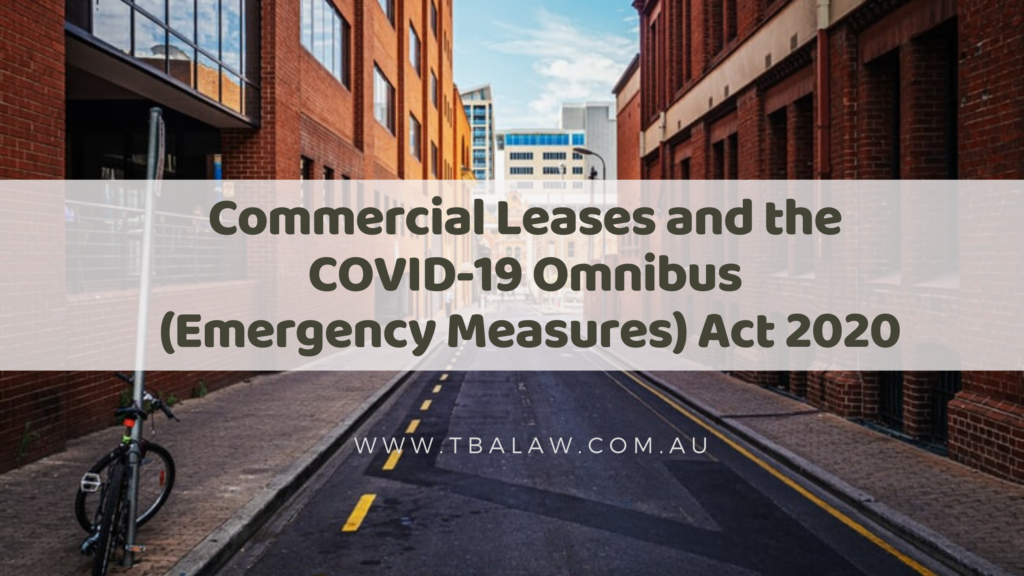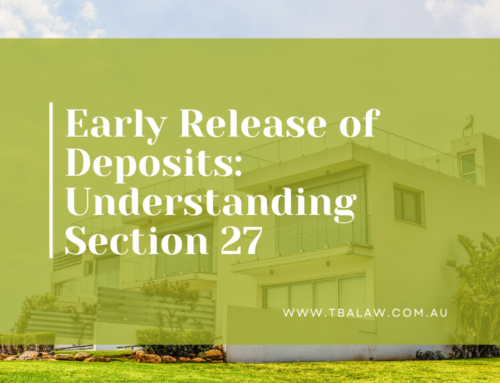Commercial Leases and the COVID-19 Omnibus (Emergency Measures) Act 2020
By Rochelle Manderson
As we are sure all of our clients would be aware of, there is a current worldwide pandemic due to the outbreak and spread of COVID-19. At TBA law, we have deliberately attempted not to blog topics that may sensationalise the issues or panic public readers about the current situation, however there has been new legislation enacted in direct response to the pandemic by government that will impact on Australian property owners, Landlords and Tenants, which needs to be addressed.

The COVID-19 Omnibus (Emergency Measures) Act 2020 was enacted into law on 24 April 2020, however the legislation will act retrospectively from 23 March 2020, meaning the terms of the legislation will apply to events, documents etc. from 24 March onward, even though the law was not enacted until April. The legislation will apply until 29 September 2020, however this is subject to change by amendment should the pandemic still require the government to continue to intervene at that point, so it is best not to rely on this end date as definitive. The legislation coves many things, however we will be looking at the legislations applies to retail or commercial leases.
What lease arrangements does the legislation apply to?
The legislation applies to both retail and non-retail leases commercial leases (so any commercial lease, whether it falls under the Retail Leases Act or not), and to commercial licences. Your arrangements must also fall into the category of an eligible lease, which is defined I the act. To be eligible, you must meet certain criteria. The tenant must have an annual turnover of $50 million dollars or less, and be running your business or businesses under the recent JobKeeper program, also enacted by government in response to the pandemic. Among other things, to take advantage of the JobKeeper program, a business must have lost more than 30% of its revenue, so therefore a tenant/tenant’s business under a lease must have also lost over 30% of their revenue from the year before. However, there are some disqualifying factors which will prevent a lease from becoming eligible under the legislation that relates to being a member of a prescribed group or entity, and their annual turnover. If your business could fall within this category, you should seek advice from your accountant and your solicitor on these exemptions.
What new regulations have been introduced under the legislation?
The legislation allows for regulations to be made on recommendation of the Minister for Small Business on many areas. One of the main features of the legislation is to prohibit the termination of an eligible lease. It may also prevent changing any time limits prescribed under a lease, exempting a landlord or a tenant from having to comply with any term of the lease, modify the operation of a term in the lease, or otherwise change or limit any other existing right the landlord may have under the lease. The legislation may also allow for terms to be implied into a lease, or to amend the application of common law principles pertaining to a lease. Finally, the legislation may impose nee obligations on Landlords and Tenants in the manner in which they mediate their dispute and may give VCAT a greater role in determining disputes in this area.
The Legislation essentially places into law the current government’s national code of conduct, so it would be advisable for everyone involved in business to be familiar with this code. In this rapidly developing area of legislation, we all should stay tuned to any changes and developments as time progresses.






Leave A Comment